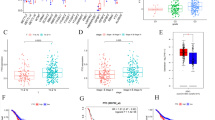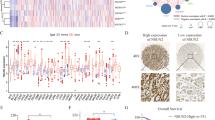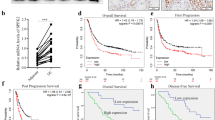Abstract
Gastric cancer (GC), a high mortality malignancy, is induced by genetic and epigenetic factors. DNA and histone methylation play critical roles in tumor suppressor genes inactivation. SRBC (serum deprivation response factor-related gene product that binds to the c-kinase), suggested as a tumor suppressor gene, participates in apoptosis, tumor chemoresistance and DNA damage response and is repressed in various cancers. Inspecting the mechanisms underlying SRBC suppression is important for cancer treatments. We investigated SRBC promoter DNA methylation status and expression of SRBC and EZH2 histone methyltrasferase in gastric cancer. Also, we surveyed SRBC expression after 5-azacitidine and UNC1999 treatments of AGS cell line. In current work, we used gastric adenocarcinoma tissues, marginal samples and normal gastric biopsies. DNA methylation was detected by Methylation- Specific PCR and mRNA expression was measured by Real-Time PCR. SRBC promoter methylation analysis, showed fully and partial methylated versions that were associated with patient’s age (p = 0.001). SRBC expression significantly decreased in GC compare with marginal and normal samples (p-value < 0.001). EZH2 showed remarkable up-regulation in GC than controls and demonstrated a strong inverse correlation with SRBC expression (r = − 0.69). Restoration of SRBC expression was observed after 5-azacitidine and UNC1999 applications with a remarkable increase by combinational treatment. We showed that EZH2 plays role in SRBC silencing in addition to DNA methylation. Our study, suggests that DNA methylation and EZH2 are involved in SRBC silencing and their inhibitors can be considered in cancer treatment investigations to overcome chemoresistance induced by SRBC inactivation.



Similar content being viewed by others
References
Daryabari SS, Safaralizadeh R, Hosseinpourfeizi M, Moaddab Y, Shokouhi B (2018) Overexpression of SSH1 in gastric adenocarcinoma and its correlation with clinicopathological features. J Gastrointest Oncol 9(4):728–733. https://doi.org/10.21037/jgo.2018.03.09
Boreiri M, Samadi F, Etemadi A, Babaei M, Ahmadi E, Sharifi AH, Nikmanesh A, Houshiar A, Pourfarzai F, Yazdanbod A, Alimohammadian M, Sotoudeh M (2013) Gastric cancer mortality in a high incidence area: long-term follow-up of Helicobacter pylori-related precancerous lesions in the general population. Arch Iran Med 16(6):343–347.
Azimzadeh-Isfanjani A, Safaralizadeh R, Hosseinpour-Feizi M, Shokouhi B, Nemati M, Moaddab S-Y (2018) Expression of miR-520c in intestinal type gastric adenocarcinoma. J Gastrointest Oncol 9(6):1184–1189. https://doi.org/10.21037/jgo.2018.08.09
Safaralizadeh R, Ajami N, Nemati M, Hosseinpourfeizi M, Azimzadeh Isfanjani A, Moaddab SY (2019) Disregulation of miR-216a and miR-217 in gastric cancer and their clinical significance. J Gastrointest Cancer 50(1):78–83. https://doi.org/10.1007/s12029-017-0019-6
Choi JD, Lee JS (2013) Interplay between epigenetics and genetics in cancer. Genom Inform 11(4):164–173. https://doi.org/10.5808/gi.2013.11.4.164
Moore LD, Le T, Fan G (2013) DNA methylation and its basic function. Neuropsychopharmacology 38(1):23–38. https://doi.org/10.1038/npp.2012.112
Dupont C, Armant DR, Brenner CA (2009) Epigenetics: definition, mechanisms and clinical perspective. Semin Reprod Med 27(5):351–357. https://doi.org/10.1055/s-0029-1237423
Weber M, Hellmann I, Stadler MB, Ramos L, Pääbo S, Rebhan M, Schübeler D (2007) Distribution, silencing potential and evolutionary impact of promoter DNA methylation in the human genome. Nat Genet 39(4):457–466. https://doi.org/10.1038/ng1990
Almouzni G, Cedar H (2016) Maintenance of epigenetic information. Cold Spring Harb Perspect Biol. https://doi.org/10.1101/cshperspect.a019372
Kamińska K, Nalejska E, Kubiak M, Wojtysiak J, Żołna Ł, Kowalewski J, Lewandowska MA (2019) Prognostic and predictive epigenetic biomarkers in oncology. Mol Diagn Ther 23(1):83–95. https://doi.org/10.1007/s40291-018-0371-7
Esteller M (2007) Epigenetic gene silencing in cancer: the DNA hypermethylome. Hum Mol Genet 16(R1):R50–R59. https://doi.org/10.1093/hmg/ddm018
Lee J-H, Byun D-S, Lee M-G, Ryu B-K, Kang M-J, Chae K-S, Lee KY, Kim H-J, Park H, Chi S-G (2008) Frequent epigenetic inactivation of hSRBC in gastric cancer and its implication in attenuated p53 response to stresses. Int J Cancer 122(7):1573–1584. https://doi.org/10.1002/ijc.23166
Tong SY, Ki KD, Lee JM, Kang MJ, Ha TK, Chung SI, Chi SG, Lee SK (2010) Frequent inactivation of hSRBC in ovarian cancers by promoter CpG island hypermethylation. Acta Obstet Gynecol Scand 89(5):629–635. https://doi.org/10.3109/00016341003678443
Xu XL, Wu LC, Du F, Davis A, Peyton M, Tomizawa Y, Maitra A, Tomlinson G, Gazdar AF, Weissman BE, Bowcock AM, Baer R, Minna JD (2001) Inactivation of human SRBC, located within the 11p15.5–p15.4 tumor suppressor region, in breast and lung cancers. Cancer Res 61(21):7943–7949
Lee JH, Kang MJ, Han HY, Lee MG, Jeong SI, Ryu BK, Ha TK, Her NG, Han J, Park SJ, Lee KY, Kim HJ, Chi SG (2011) Epigenetic alteration of PRKCDBP in colorectal cancers and its implication in tumor cell resistance to TNFα-induced apoptosis. Clin Cancer Res 17(24):7551–7562. https://doi.org/10.1158/1078-0432.ccr-11-1026
Zochbauer-Muller S, Fong KM, Geradts J, Xu X, Seidl S, End-Pfutzenreuter A, Lang G, Heller G, Zielinski CC, Gazdar AF, Minna JD (2005) Expression of the candidate tumor suppressor gene hSRBC is frequently lost in primary lung cancers with and without DNA methylation. Oncogene 24(41):6249–6255. https://doi.org/10.1038/sj.onc.1208775
Gan L, Yang Y, Li Q, Feng Y, Liu T, Guo W (2018) Epigenetic regulation of cancer progression by EZH2: from biological insights to therapeutic potential. Biomark Res 6:10. https://doi.org/10.1186/s40364-018-0122-2
Kodach LL, Jacobs RJ, Heijmans J, van Noesel CJ, Langers AM, Verspaget HW, Hommes DW, Offerhaus GJ, van den Brink GR, Hardwick JC (2010) The role of EZH2 and DNA methylation in the silencing of the tumour suppressor RUNX3 in colorectal cancer. Carcinogenesis 31(9):1567–1575. https://doi.org/10.1093/carcin/bgq147
Moutinho C, Martinez-Cardús A, Santos C, Navarro-Pérez V, Martínez-Balibrea E, Musulen E, Carmona FJ, Sartore-Bianchi A, Cassingena A, Siena S, Elez E, Tabernero J, Salazar R, Abad A, Esteller M (2014) Epigenetic inactivation of the BRCA1 interactor SRBC and resistance to oxaliplatin in colorectal cancer. J Natl Cancer Inst 106(1):322. https://doi.org/10.1093/jnci/djt322
Chen Z, Yang P, Li W, He F, Wei J, Zhang T, Zhong J, Chen H, Cao J (2018) Expression of EZH2 is associated with poor outcome in colorectal cancer. Oncol Lett 15(3):2953–2961. https://doi.org/10.3892/ol.2017.7647
Vandesompele J, De Preter K, Pattyn F, Poppe B, Van Roy N, De Paepe A, Speleman F (2002) Accurate normalization of real-time quantitative RT-PCR data by geometric averaging of multiple internal control genes. Genome Biol. https://doi.org/10.1186/gb-2002-3-7-research0034
Kumari K, Das B, Adhya AK, Rath AK, Mishra SK (2019) Genome-wide expression analysis reveals six contravened targets of EZH2 associated with breast cancer patient survival. Sci Rep 9(1):1974. https://doi.org/10.1038/s41598-019-39122-4
Ding Y, Yang Q, Wang B, Ye G, Tong X (2016) The correlation of MGMT promoter methylation and clinicopathological features in gastric cancer: a systematic review and meta-analysis. PLoS ONE 11(11):e0165509. https://doi.org/10.1371/journal.pone.0165509
Li D, Bai Y, Feng Z, Li W, Yang C, Guo Y, Lin C, Zhang Y, He Q, Hu G, Li X (2019) Study of promoter methylation patterns of HOXA2, HOXA5, and HOXA6 and its clinicopathological characteristics in colorectal cancer. Front Oncol. https://doi.org/10.3389/fonc.2019.00394
Gupta R, Toufaily C, Annabi B (2014) Caveolin and cavin family members: dual roles in cancer. Biochimie 107:188–202. https://doi.org/10.1016/j.biochi.2014.09.010
He LJ, Cai MY, Xu GL, Li JJ, Weng ZJ, Xu DZ, Luo GY, Zhu SL, Xie D (2012) Prognostic significance of overexpression of EZH2 and H3k27me3 proteins in gastric cancer. Asian Pac J Cancer Prev 13(7):3173–3178. https://doi.org/10.7314/apjcp.2012.13.7.3173
Pan YM, Wang CG, Zhu M, Xing R, Cui JT, Li WM, Yu DD, Wang SB, Zhu W, Ye YJ, Wu Y, Wang S, Lu YY (2016) STAT3 signaling drives EZH2 transcriptional activation and mediates poor prognosis in gastric cancer. Mol Cancer 15(1):79. https://doi.org/10.1186/s12943-016-0561-z
Fujii S, Ito K, Ito Y, Ochiai A (2008) Enhancer of zeste homologue 2 (EZH2) down-regulates RUNX3 by increasing histone H3 methylation. J Biol Chem 283(25):17324–17332. https://doi.org/10.1074/jbc.M800224200
Acknowledgements
We would like to thank to staff in Departments of Pathology and Surgery as well as Endoscopy Section in Imam Reza and Shahid Madani hospitals of Tabriz, Tabriz, Iran that kindly contributed with this investigation.
Funding
This work was funded by University of Tabriz, Tabriz, Iran.
Author information
Authors and Affiliations
Contributions
Conceptualization and Study design: MAHF, RS and SR Patient’s sample provision: YM Experiments: SR Data analysis and interpretation: SR, MAHF and RS Writing—original draft preparation: SR Writing—review and editing: SR, MAHF, YM and RS Funding acquisition: MAHF and RS Supervision: MAHF and RS. All authors read and approved the final manuscript.
Corresponding authors
Ethics declarations
Conflict of interest
The authors declare that they have no conflict of interest.
Ethical approval
All participants received and signed an informed written consent. The study was conducted according to the research ethics approved by the committee of Tabriz University of Medical Sciences (Reference Number: IR.TBZMED.REC.1397.772).
Additional information
Publisher's Note
Springer Nature remains neutral with regard to jurisdictional claims in published maps and institutional affiliations.
Rights and permissions
About this article
Cite this article
Rezaei, S., Hosseinpourfeizi, M.A., Moaddab, Y. et al. Contribution of DNA methylation and EZH2 in SRBC down-regulation in gastric cancer. Mol Biol Rep 47, 5721–5727 (2020). https://doi.org/10.1007/s11033-020-05619-9
Received:
Accepted:
Published:
Issue Date:
DOI: https://doi.org/10.1007/s11033-020-05619-9




